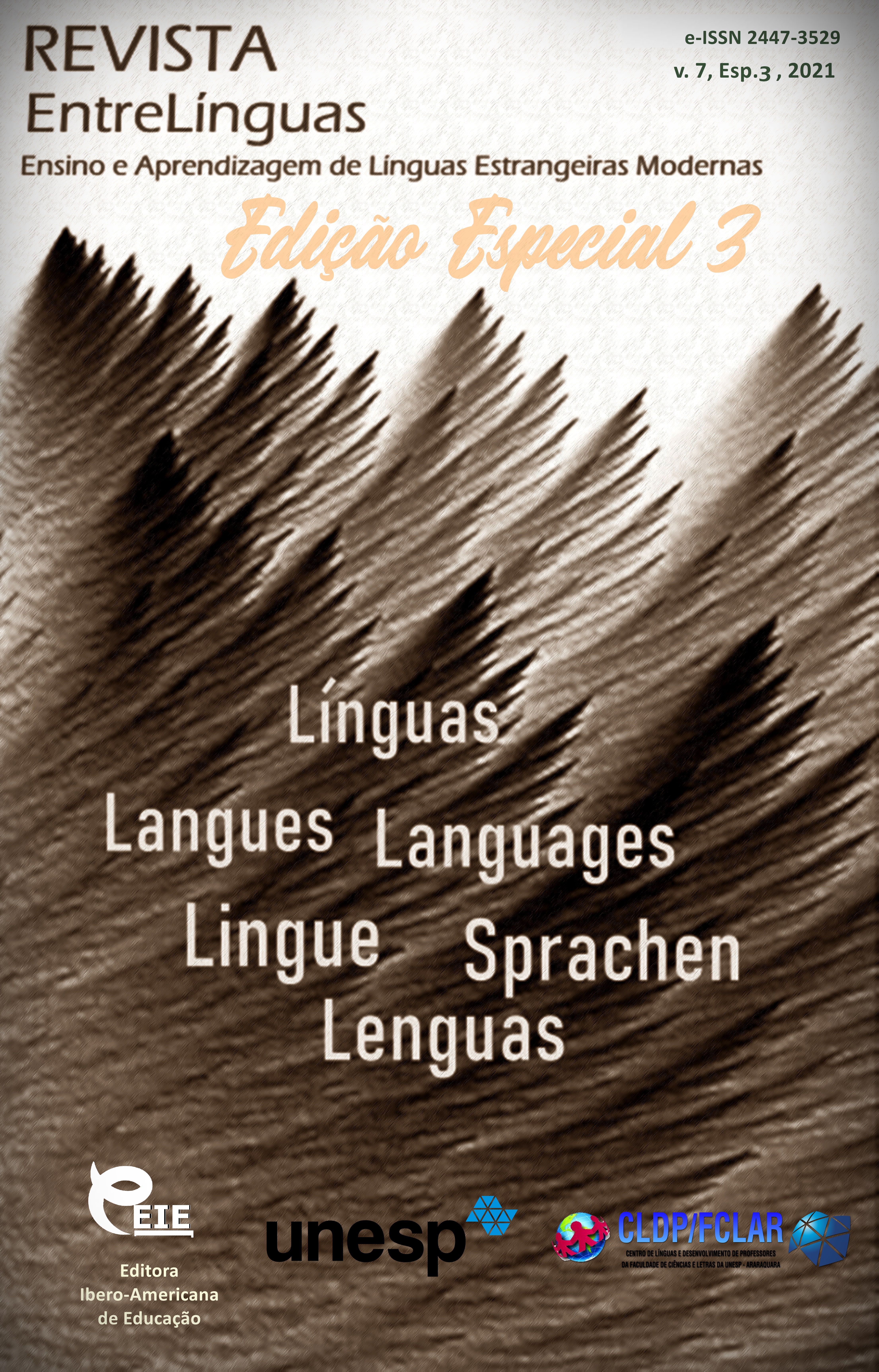Formas de expressar a agressão verbal no chinês
DOI:
https://doi.org/10.29051/el.v7iesp.3.15732Palavras-chave:
Grosseria, Estratégias e tipos, Linguagem obscena, Língua chinesa, Interpretação por escritoResumo
Desde a primeira infância, as pessoas ouvem e aprendem expressões indelicadas e as usam em um contexto situado. Este artigo sugere o estudo do fenômeno da "falta de educação" na língua chinesa, sobre por que e quando as pessoas usam palavras de falta de educação. Desde a primeira infância, ouvimos linguagem obscena ou afirmações indelicadas na direção de uma pessoa, situação ou algumas coisas. O artigo trata de declarações que têm um destinatário e um ouvinte. Com a ajuda de certas estratégias que serão analisadas, a pessoa tenta influenciar o outro. Por sua vez, os enunciados são divididos em determinadas categorias, possuem nuances próprias e frequência de uso. A língua chinesa não é exceção. A frequência do uso de linguagem obscena em chinês está aumentando dramaticamente, o que se deve em parte ao uso difundido de redes sociais e da Internet em geral. As pessoas têm a oportunidade de escrever literatura sem censura, de postar comentários raivosos em notícias e registros, uma vez que é possível fazer isso anonimamente. Analisaremos diferentes tipos de linguagem obscena chinesa, seus tipos, contextos de uso e etc. Além disso, tentaremos dar uma definição clara de "falta de educação" que combina todas as anteriores existentes. Esperamos que este trabalho ajude a compreender os objetivos da ‘falta de educação’ verbal, seus pontos específicos e formas de interpretação na escrita, com exemplos como comentários e declarações literárias.
Downloads
Referências
BOUSFIELD, D. Impoliteness in interaction. Philadelphia and Amsterdam: John Benjamins, 2008.
BUGARSKI, R. Language in context. Belgrade, 1997.
CULPEPER, J. Impoliteness: using language to cause offence. Cambridge University Printing House, 2011.
DEYING, F. Winter Jasmine. Shandong Publishing House of literature and Art, 2019.
HUANG, K. Face and favor: the chinese power game. The American Journal of Sociology, v. 92, n. 4, 1987. DOI: doi.org/10.1086/228588
KIENPOINTNER, M. Varieties of rudeness: types and functions of impolite utterances. University of Innsbruck, 1997.
MUHAMETZYANOV, R. R.; USMANOVA, I. R. The problem of destiny in ancient chinese philosophy. Revista Publicando, v. 5, n. 16, p. 617-622, 2018.
SHERBININA, Y. Problems of verbal aggression in the communication of students. Moscow: Forum, 2003.
ZHONG, W. Linguistic impoliteness strategies in sina weibo comments. Beijing Foreign Studies University, 2018.
Downloads
Publicado
Como Citar
Edição
Seção
Licença

Este trabalho está licenciado sob uma licença Creative Commons Attribution-NonCommercial-ShareAlike 4.0 International License.
Os manuscritos aceitos e publicados são de propriedade da Revista EntreLínguas. Os artigos publicados e as referências citadas na Revista EntreLínguas são de inteira responsabilidade de seus autores.
Transferência de direitos autorais – autorização para publicação
Caso o artigo submetido seja aprovado para publicação, já fica acordado que o(s) autor(es) autoriza(m) a UNESP a reproduzi-lo e publicá-lo na EntreLínguas, entendendo-se os termos “reprodução” e “publicação” conforme definição respectivamente dos incisos VI e I do artigo 5° da Lei 9610/98. O artigo poderá ser acessado pela rede mundial de computadores (Internet), sendo permitidas, a título gratuito, a consulta e a reprodução de exemplar do artigo para uso próprio de quem a consulta, desde que haja a citação ao texto consultado. Essa autorização de publicação 328 EntreLínguas, Araraquara, v. 1, n .2, p. 323-328, jul./dez. 2015 não tem limitação de tempo, ficando a UNESP responsável pela manutenção da identificação do(s) autor(es) do artigo. Os artigos publicados e as referências citadas na Revista EntreLínguas são de inteira responsabilidade de seus autores.











